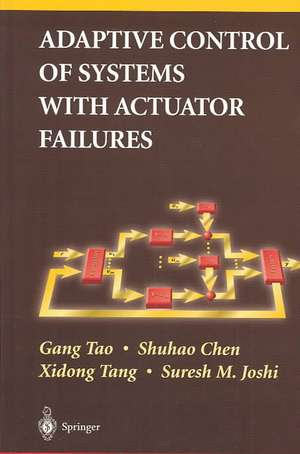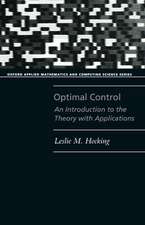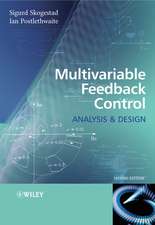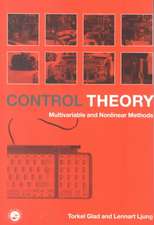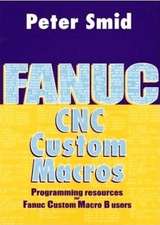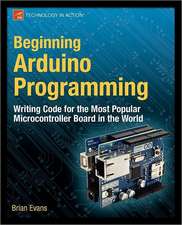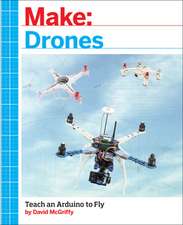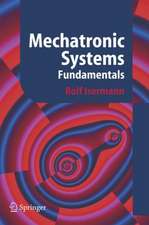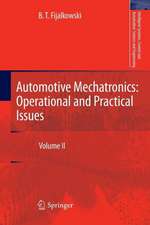Adaptive Control of Systems with Actuator Failures
Autor Gang Tao, Shuhao Chen, Xidong Tang, Suresh M. Joshien Limba Engleză Hardback – 10 mai 2004
This monograph centers on counteracting situations in which unknown control inputs become indeterminately unresponsive over an uncertain period of time by adapting the responses of remaining functional actuators. Both "lock-in-place" and varying-value failures are dealt with. The results presented demonstrate:
• the existence of nominal plant-model matching controller structures with associated matching conditions for all possible failure patterns;
• the choice of a desirable adaptive controller structure;
• derivation of novel error models in the presence of failures;
• the design of adaptive laws allowing controllers to respond to combinations of uncertainties stemming from activator failures and system parameters.
| Toate formatele și edițiile | Preț | Express |
|---|---|---|
| Paperback (1) | 945.47 lei 6-8 săpt. | |
| SPRINGER LONDON – 10 noi 2010 | 945.47 lei 6-8 săpt. | |
| Hardback (1) | 951.77 lei 6-8 săpt. | |
| SPRINGER LONDON – 10 mai 2004 | 951.77 lei 6-8 săpt. |
Preț: 951.77 lei
Preț vechi: 1160.70 lei
-18% Nou
Puncte Express: 1428
Preț estimativ în valută:
182.12€ • 190.15$ • 150.73£
182.12€ • 190.15$ • 150.73£
Carte tipărită la comandă
Livrare economică 05-19 aprilie
Preluare comenzi: 021 569.72.76
Specificații
ISBN-13: 9781852337889
ISBN-10: 1852337885
Pagini: 320
Ilustrații: XVI, 299 p.
Dimensiuni: 155 x 235 x 20 mm
Greutate: 0.63 kg
Ediția:2004
Editura: SPRINGER LONDON
Colecția Springer
Locul publicării:London, United Kingdom
ISBN-10: 1852337885
Pagini: 320
Ilustrații: XVI, 299 p.
Dimensiuni: 155 x 235 x 20 mm
Greutate: 0.63 kg
Ediția:2004
Editura: SPRINGER LONDON
Colecția Springer
Locul publicării:London, United Kingdom
Public țintă
Professional/practitionerCuprins
1. Introduction.- 2. State Feedback Designs for State Tracking.- 3. State Feedback Designs for Output Tracking.- 4. Output Feedback Designs for Output Tracking.- 5. Designs for Multivariable Systems.- 6. Pole Placement Designs.- 7. Designs for Linearized Aircraft Models.- 8. Robust Designs for Discrete-Time Systems.- 9. Failure Compensation for Nonlinear Systems.- 10. State Feedback Designs for Nonlinear Systems.- 11. Nonlinear Output Feedback Designs.- 12. Conclusions and Research Topics.- A.1 Model Reference Adaptive Control.- A.1.1 MRAC: State Feedback for State Tracking.- A.1.2 MRAC: State Feedback for Output Tracking.- A.1.3 MRAC: Output Feedback for Output Tracking.- A.2 Multivariable MRAC.- A.3 Adaptive Pole Placement Control.- References.
Recenzii
From the reviews:
The monograph describes adaptive actuator failure compensation control schemes for systems with uncertain actuator failures … The monograph is a comprehensive and self-contained exposition supposing the knowledge of linear systems and feedback control at the undergraduate level. Graduate students, researchers, and professionals working in the areas of control engineering, computer science, and applied mathematics will appreciate this book as a significant up-to-date technical reference in the field.
Zentralblatt MATH 1063 (2005) (Reviewer: Lubomír Bakule)
The monograph describes adaptive actuator failure compensation control schemes for systems with uncertain actuator failures … The monograph is a comprehensive and self-contained exposition supposing the knowledge of linear systems and feedback control at the undergraduate level. Graduate students, researchers, and professionals working in the areas of control engineering, computer science, and applied mathematics will appreciate this book as a significant up-to-date technical reference in the field.
Zentralblatt MATH 1063 (2005) (Reviewer: Lubomír Bakule)
Notă biografică
Gang Tao received his B.S. degree in Electrical Engineering from the University of Science and Technology of China in 1982, his M.S. degrees in Electrical Engineering, Computer Engineering and Applied Mathematics in 1984, 1987, 1989, respectively, and Ph.D. degree in Electrical Engineering in 1989 all from the University of Southern California. He was a visiting assistant professor at Washington State University from 1989 to 1991, an assistant research engineer at the University of California at Santa Barbara from 1991 to 1992, and an assistant professor at the University of Virginia from 1992 to 1998, where he is now an associate professor. He was a guest editor for International Journal of Adaptive Control and Signal Processing, and is currently an associate editor for IEEE Transactions on Automatic Control and for the discipline’s most important journal Automatica. He has been a program committee member for numerous international conferences, among them, American Control Conference and the Conference on Decision and Control in 2001 and 2002.. He has published five books, over 45 journal papers and book chapters, and over 95 conference papers on adaptive cotnrol, nonlinear control, multivariable control, optimal control, and control applications and robotics. He is a Senior Member of IEEE. His research has been supported by NSF, ARMY, NASA, MedQuest, SCEEE and Edison Power.
Textul de pe ultima copertă
When an actuator fails, chaos or calamity can often ensue.
It is because the actuator is the final step in the control chain, when the control system’s instructions are made physically real that failure can be so important and hard to compensate for. When the nature or location of the failure is unknown, the offsetting of consequent system uncertainties becomes even more awkward.
Adaptive Control of Systems with Actuator Failures centers on counteracting situations in which unknown control inputs become indeterminately unresponsive over an uncertain period of time by adapting the responses of remaining functional actuators. Both "lock-in-place" and varying-value failures are dealt with. The results presented demonstrate:
• the existence of nominal plant-model matching controller structures with associated matching conditions for all possible failure patterns;
• the choice of a desirable adaptive controller structure;
• derivation of novel error models in the presence of failures;
• the design of adaptive laws allowing controllers to respond to combinations of uncertainties stemming from activator failures and system parameters.
Adaptive Control of Systems with Actuator Failures will be of significance to control engineers generally and especially to both academics and industrial practitioners working on safety-critical systems or those in which full-blown fault identification and diagnosis is either too time consuming or too expensive.
It is because the actuator is the final step in the control chain, when the control system’s instructions are made physically real that failure can be so important and hard to compensate for. When the nature or location of the failure is unknown, the offsetting of consequent system uncertainties becomes even more awkward.
Adaptive Control of Systems with Actuator Failures centers on counteracting situations in which unknown control inputs become indeterminately unresponsive over an uncertain period of time by adapting the responses of remaining functional actuators. Both "lock-in-place" and varying-value failures are dealt with. The results presented demonstrate:
• the existence of nominal plant-model matching controller structures with associated matching conditions for all possible failure patterns;
• the choice of a desirable adaptive controller structure;
• derivation of novel error models in the presence of failures;
• the design of adaptive laws allowing controllers to respond to combinations of uncertainties stemming from activator failures and system parameters.
Adaptive Control of Systems with Actuator Failures will be of significance to control engineers generally and especially to both academics and industrial practitioners working on safety-critical systems or those in which full-blown fault identification and diagnosis is either too time consuming or too expensive.
Caracteristici
Will show the reader new ways to compensate for disturbances in control systems prolonging the intervals between time-consuming and/or expensive fault diagnosis procedures Keeps the reader up to date in the increasingly important field of adaptive control
